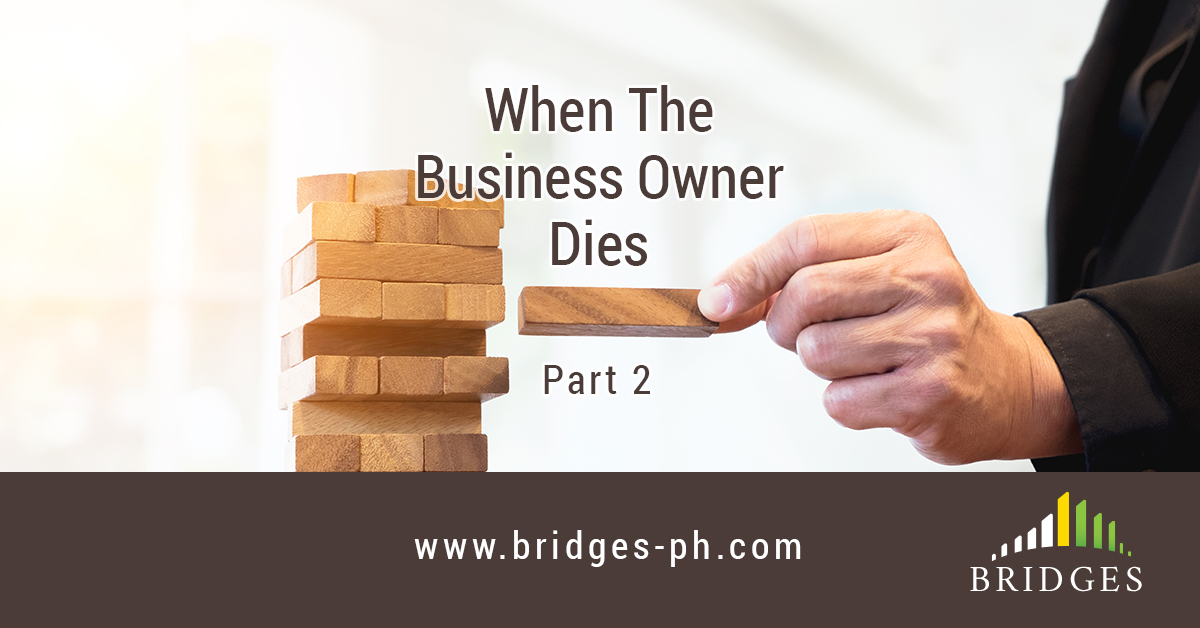
Contrary to the commonly used phrase “one size fits all”, many factors have to be considered before deriving at a solution program to meet the challenges of creating a safety net for the business in the event that the business owner dies. And this program has to be put into place while the business owner is still alive and capable.
An effective business plan would have the objective of profit. And the best formula would be one that *maximizes revenue and minimizes cost. It is the same with a prescribed safety net program which aims to cushion the impact that the demise of a business owner has on his business and the people involved. There is a variety of instruments that can be used to compose the said program. However, it should be determined at the onset what the business owner wants to happen to his business and his business interests. Does he plan to **(1) retain it, (2) sell it, or (3) liquidate it?
Retain the Business
- Is there a member in the family capable to run the business? Is he interested to run the business?
- Will the surviving owners/heirs be willing to do business with them?
- How long will it take for the business to run smoothly under the new management?
Sell the Business
- Who is the buyer?
- At what price will it be sold?
- In what terms and conditions?
- Is there a pre-arranged agreement?
- Is the agreement funded without loopholes?
Liquidate the Business
- At what liquidation value?
- How much, after the final expenses, taxes and administrative cost, will the family receive?
- Will the remainder be enough to provide for the surviving family without the business?
***
Will
Written document (testament) by which a person (the testator) directs how his or her assets (estate) are to be distributed upon death. Among other provisions, a will may appoint executors to administer the estate, name guardian for a child, and/or make arrangement for payment of obligations. Commonly, the law requires that the testator must have testamentary capacity when making the will, and that it be witnessed by two or more credible witnesses. It is not always necessary, however, that the will bears the signature of the testator. Someone else may sign it on behalf of, and in the presence of, the testator and a required number of witnesses.
A will is (1) not effective until the death of the testator, (2) can be amended by duly executed alterations or by attaching a supplementary document (called codicil), and (3) can be revoked at any time by the testator (a) by its destruction, or (b) by making another will that revokes the earlier will or is inconsistent with it provisions. Because the law generally presumes the testator would want a different manner of distribution of estate upon his or her marriage, remarriage, or divorce, a will is usually automatically revoked upon such occurrence except where the testator intended it (at the time of making the will) to survive such acts. A testator may make different wills that relate to different assets, but any provision relating to a particular asset will be invalidated by an inconsistent provision in a later will.
Trust
Legal entity created by a party (the trustor) through which a second party (the trustee) holds the right to manage the trustor's assets or property for the benefit of a third party (the beneficiary). The four main types of trusts are: (1) Living: trust created by the trustor while he or she is alive. (2) Testamentary: trust established through a will and which comes into effect (is created) when the trustor dies. (3) Revocable: trust that can be modified or terminated by the trustor after its creation. (4) Irrevocable: trust that cannot be modified or terminated by the trustor after its creation.
Key Person Protection
Life and/or disability insurance on one (or more) key persons whose loss or unavailability may cause loss of profit, goodwill, or increase in expenses. These insurance policies help finance the search and training of a successor, or compensate for fall in profits. Also called key employee insurance.
Buy-Sell Agreement
An approach used by sole proprietorships, partnerships and closed corporations to divide the business share or interest of a proprietor, partner, or shareholder. The owner of the business interest being considered has to be disabled, deceased, retired or expressed interest in selling. The buy and sell agreement requires that the business share is sold according to a predetermined formula to the company or the remaining members of the business. Before the interest of a deceased partner can be sold to the company or remaining partners, the deceased's estate must agree to sell.
In order to ensure the availability of funds in the event of a partner's death, most parties will purchase life insurance policies on the other partners. In the event of a death, the proceeds from the life insurance policy are used to purchase a portion of the deceased's business interest. It is important to note that when a sole proprietor dies, since he/she has no partners, a key employee is the buyer or successor.
- Stock Redemption Agreement
Agreement between a closely-held or private firm and its shareholders for regulating the sale and transfer of firm's shares. It covers items such as who has the right of first refusal, and provides a mechanism for the purchase (redemption) of the shares of the shareholder who becomes bankrupt, is discharged, resigns, retires, becomes incapacitated, or dies.
- Cross Purchase Agreement
A document that allows a company's partners or other shareholders to purchase the interest or shares of a partner who is deceased, incapacitated or retiring. A cross-purchase agreement is used in business continuation planning. The document outlines how the shares can be divided or purchased by the remaining partners, such as a proportional distribution according to each partner's stake in the company.
Because a cross-purchase agreement may result in shares becoming unexpectedly available (e.g. in the event of a partner's death), a partner will likely take out life insurance policies on the other partners and list himself as the beneficiary. If one of the partners dies, the funds from the life insurance policy can be used to buy the deceased's interest. Some cross-purchase agreements use a specific amount to calculate the buyout price, while others use a formula.
- Employee Buyout
Purchase of the controlling stock or shares of a corporation by its own management or employees.
The dynamics and variables in a safety net program are quite vast. It is advisable not to “self-diagnose and self-medicate” if the business owner is not a specialist. There are professionals in the insurance and financial services industry who specialize in assisting entrepreneurs, business owners, corporations and institutions with the creation of such programs. A regular review should be scheduled among the parties at least once every two years to provide continuous professional advice in cases when the program needs any alteration or improvement.
Bridges-PH is focused on COMPREHENSIVE FINANCIAL PLANNING specializing in assisting entrepreneurs, sme business owners, corporations and institutions and its leaders and members with the creation of customized programs that will serve as safety nets to cushion the impact of certain expected and unforeseen risks while they continue to grow and expand their businesses. Let us help you set up your personalized safety net program.
Services We Provide http://www.bridges-ph.com/services/
*Borrowed phrase from Aristides “Jong” S. Merida, Jr., Director & Lead Faculty, Wealth Management Center for Communications & Research, Inc.
**Conceptualized by Rosendo "Boy" Flores, Author of Business Continuity & Estate Conservation Planning Course, CASH 101 & Financial Blueprint
*** http://www.businessdictionary.com/ , http://www.investopedia.com/
linkiNG you to opportunities,



